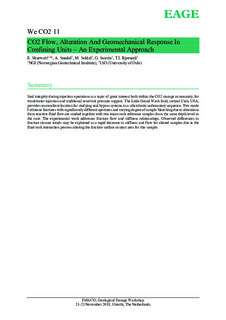| dc.contributor.author | Skurtveit, Elin | |
| dc.contributor.author | Sundal, Anja | |
| dc.contributor.author | Soldal, Magnus | |
| dc.contributor.author | Sauvin, Guillaume | |
| dc.contributor.author | Bjørnarå, Tore Ingvald | |
| dc.date.accessioned | 2019-03-14T10:13:16Z | |
| dc.date.available | 2019-03-14T10:13:16Z | |
| dc.date.created | 2019-02-22T11:36:31Z | |
| dc.date.issued | 2018 | |
| dc.identifier.uri | http://hdl.handle.net/11250/2589975 | |
| dc.description.abstract | Seal integrity during injection operations is a topic of great interest both within the CO2 storage community, for wastewater injection and traditional reservoir pressure support. The Little Grand Wash fault, central Utah, USA, provides an excellent location for studying seal bypass systems in a siliciclastic sedimentary sequence. Two mode I siltstone fractures with significantly different apertures and varying degree of sample bleaching due to alterations from reactive fluid flow are studied together with two intact rock reference samples from the same depth level in the core. The experimental work addresses fracture flow and stiffness relationships. Observed differences in fracture closure trends may be explained as a rapid decrease in stiffness and flow for altered samples due to the fluid rock interaction process altering the fracture surface contact area for this sample | |
| dc.language.iso | eng | |
| dc.title | CO2 Flow, Alteration And Geomechanical Response In Confining Units – An Experimental ApproachGreen Open Access | |
| dc.type | Lecture | |
| dc.description.version | publishedVersion | |
| dc.identifier.cristin | 1679824 | |
| cristin.unitcode | 7452,4,5,0 | |
| cristin.unitcode | 7452,4,4,0 | |
| cristin.unitname | Petroleumsgeomekanikk og geofysikk (PGG) | |
| cristin.unitname | Laboratorium og modellforsøk | |
| cristin.ispublished | true | |
| cristin.fulltext | original | |
